May, 1536. Anne Boleyn, King Henry VIII’s second wife, is dead. As the axe drops, Thomas Cromwell emerges from the bloodbath to continue his climb to power and wealth, while his formidable master, Henry, settles to short-lived happiness with his third queen, Jane Seymour.
Cromwell, a man with only his wits to rely on, has no great family to back him, and no private army. Navigating the moral complexities that accompany the exercise of power in this brutal and bloody time, Cromwell is caught between his desire to do what is right and his instinct to survive. But in the wake of Henry having executed his queen, no one is safe.
Despite rebellion at home, traitors plotting abroad and the threat of invasion testing Henry’s regime to breaking point, Cromwell’s robust imagination sees a new country in the mirror of the future. All of England lies at his feet, ripe for innovation and religious reform. But as fortune’s wheel turns, Cromwell’s enemies are gathering in the shadows.
The inevitable question remains: how long can anyone survive under Henry’s cruel and capricious gaze?
Eagerly awaited and ten years in the making, Wolf Hall: The Mirror and the Light will trace the final four years of Cromwell’s life, completing his journey from self-made man to the second most powerful man in the kingdom. Cromwell is as complex as he is unforgettable: a politician and a fixer, a diplomat and a father, a man who both defied and defined his age.
Interview with Mark Rylance (Thomas Cromwell)
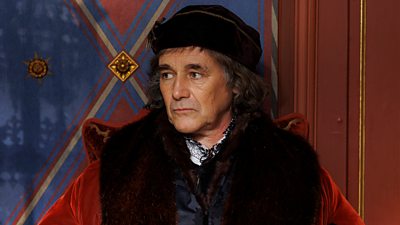
Where did we leave Cromwell at the end of the first series?
We left Cromwell right after the execution of Anne Boleyn. She was someone who he really liked because she was intelligent and cultured, so I think it was quite tragic for him. This series begins right at the same moment, with a different perspective of the execution. Cromwell is a guard dog and becomes increasingly required to be a brutal guard dog for his master, but he never really loses his compassion and empathy for other human beings.
Can you tell us about the women in Cromwell’s world?
I think Cromwell gets on with women better than men. There are a number of very strong women in this series: Jane Seymour, who you get an impression in the first series that Cromwell is falling in love with, and then has to step back when he witnesses Henry VIII falling in love with her. We also have Lady Mary, the daughter of Henry’s first wife, Katherine of Aragon, who is a fascinating character. She was just a young girl in the first series and now is showing all the intelligence of a ruling person. In the first series the concern was whether Anne would survive or not, but this time it’s my head that’s approaching the scaffold through the series.
Who are Cromwell’s allies and enemies?
His primary enemies are the old families – the Courtenays and the Poles are not friends of Cromwell, primarily because they see the Tudor dynasty as a blip in the much longer dynasties of their families. They don’t like the idea of a common man rising up and replacing many posts in the governance of England with people of merit rather than people of aristocracy. Cromwell is increasingly on his own. Jane Seymour and her family are allies because they feel Cromwell has been part of their success. One of his wards, Rafe Sadler, is definitely an ally. Others are perceived allies, most of them people who Cromwell has helped to move forward, but in the end turn out to be something different.
What is Cromwell’s relationship with Henry like?
It’s very nice to be playing with Damian Lewis again, and his very subtle and mysterious Henry VIII. He was raised to be Archbishop of Canterbury because his brother Arthur was going to be King, and then is thrust into being an earthly monarch rather than a heavenly advisor. He’s very sensitive and very powerful, so there’s that appeal of working for someone who has the power to affect enormous good and if you catch him in the right mood then great things can happen. It’s a remarkable thing that he has advanced a person like Cromwell because of his merit and ability. Cromwell was a very early activist in trying to get English translations of the Bible into every man and woman’s hand. This sounds natural now, but this was a very dangerous thing at the time, and people are being burnt left, right and centre. It’s quite a thing to act in this story and to come into touch with just how very violent our society was 500 years ago. We’re still pretty violent now, but this was intense. Cromwell is walking the line, very close to that being his fate. I don’t know how you would prepare yourself for that.
What was it like working with Peter Kosminsky again?
Peter Kosminsky and I go back to the first time he wrote and directed a fiction. He began with very important documentaries and he’s always been a very brave storyteller. He doesn’t use fiction to escape from things, but rather to amplify or give focus to what’s happening in the present times. This is the fourth large series we’ve worked on together and it’s very much like working with a brother. It’s the closest relationship I’ve had in filmmaking. He’s impeccably organised and wonderfully flexible to what the actors bring to the scenes. He visits you every morning in the makeup truck to find out how you’re feeling.
And you filmed at lots of fantastic locations…
A delightful part of the job is these curious places. When I hit hard times I will do a Cromwell tour for American tourists coming to England – that will keep me going in my old age! To play Thomas Cromwell in the Great Hall at Hampton Court where he lived and worked is very spooky. You get a shiver up your spine walking in the places where they walked and lived. It’s interesting to see this fantastic palace of power, and now it’s empty and all the politicians are in Westminster or at Downing Street. How all that power fades, how it all just dissolves and reappears in other forms. These remarkable buildings are in many ways a bigger star of the programme than we are.
Does Cromwell see his downfall coming?
I think that’s a good question for the audience to consider, it’s one of the delights you’ll have watching the programme. I think he gets tired and there are times when he fantasises for a different life. He’s always aware that something bad could happen. You are reaping great benefits, great wealth, but you are dealing with people who are trying to put a knife in your back. You’re dealing with a very violent regime that is sustained by violence. And you are an agent of that regime.
Interview with Damian Lewis (King Henry VIII)
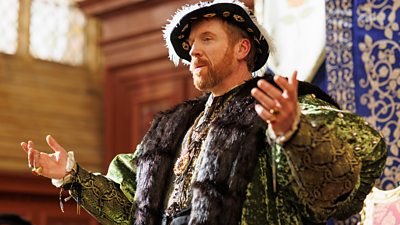
Where do we pick-up with Henry in The Mirror and the Light?
Henry was under great pressure politically from the Roman Catholic church who tried to excommunicate him because, as every school child knows, he divorced Katherine of Aragon in order to marry Anne Boleyn – I think just because he really fancied her! I think he loved Katherine of Aragon, he fancied Anne Boleyn – who was tricky, smart and a reformist who caused him a lot of headaches – but he really loved Jane Seymour. Every marriage was political as well as personal. Henry was an interesting character and – in spite of his murderous tendencies! – he believed in love. He wanted to feel love and be loved, and I think he felt he could have this with Jane Seymour.
Can you tell us about Henry’s concerns about his position in the Court?
I think what is probably true of Henry is that there was a deep insecurity in him underneath the magnificence. He believed he possessed this magnificence. He believed he was next to God on Earth. But I think deep down there was an insecurity about him not being able to provide male heirs and his children not surviving. In Tudor times, they believed very strongly that if you had many extra marital affairs, you were less likely to have healthy children within marriage. It was a new dynasty. The Tudors, Henry VIII, had a thin claim to the throne. There were great families around – the Poles, the Courtenays – and they stoke Henry’s paranoia all through his reign. In fact, it’s one of the central reasons that Thomas Cromwell loses his head in the end.
Please tell us about Cromwell and Henry’s partnership...
Henry enjoys Cromwell’s honesty, his truth, and his ability to get things done. So he doesn’t have to think too hard about them himself. Henry was many things – he loved his pastimes and his pursuits, he spent a long time trying to create this idea of an Arthurian romantic court where people wrote poetry and played music and learnt languages, and where romantic love and the chivalric code were very important. This meant that there wasn’t always a lot of time to run the country, so he had Wolsey to do it for him, and then he had Cromwell. The essential difference was that Wolsey was really responsible for bringing up Henry and he knew Henry as a little boy. Wolsey was a father figure to him in a way that Henry’s own father wasn’t. Whereas Cromwell was the wheeler-dealer behind everything and, in the end, the architect of the dissolution of the monasteries.
We’re speaking in February 2024 on set between scenes, and your current look is magnificent. What’s it like wearing such fantastic costumes?
Oh, this is just something I threw on for this interview! This is a heavily foamed suit that goes all the way down into my knees. But it’s bloody hot, I’ll tell you that much. I’m the only person on set who hasn’t been cold since the start of November. I suppose what’s been fun about this is exploding certain myths. Until 1536, when Henry fell off his horse and had a bad injury to his leg, he was vigorous, athletic, and tall. Part of his tragedy, part of his short-temperedness with everything – if you’re in the wrong place at the wrong time you might get your head cut off – is because he was unable to ride, hunt and joust… unable to do the physical things that he had always done. So he was in great pain for a lot of his time and his mood altered. He lost his looks very quickly.
Please tell us about working with Mark and Peter.
They’re amazing. The sheer level of concentration, focus and attention to detail they both have means that they unapologetically protect the work. And it’s an unfashionable thing to do, but the space you’re in when you work has something serious about it, and you can create something magical and sacred if you’re prepared to do it and not have people on phones mucking about too much. It’s good to have a bit of a laugh sometimes, otherwise we’d tear our hair out, but essentially it’s a special space and you come in and work. Mark and I talk about it a lot, it’s very hard as an actor on a film set to retain your bubble because filming is an industrial endeavour. In order to create an imaginative space you have to work hard and it’s made much easier with Mark and Peter running it because they demand that. Peter is meticulous, he’s unbelievably well prepared and knows the story inside out – who’s just lost their head, who’s in power, who has got a small force amassing up in Yorkshire, who hasn’t, what the French are doing – at any given moment of the story. And so his ability to place you in the story perfectly is brilliant. And I just love working with Mark. It’s like tennis, and when you hit something with a bit of slice and it comes back with topspin. It’s really fun. He’s not ‘Sir Mark Rylance’ for no reason.
Interview with Kate Phillips (Jane Seymour)
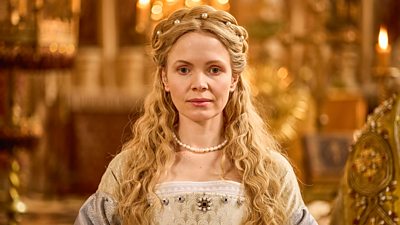
Please tell us about Jane Seymour.
Jane is the third wife of Henry VIII. She was believed to be one of the lowest born of all of the queens, but she’s been a lady in waiting to Katherine of Aragon, and later to Anne Boleyn, so she’s been at Court for some time. Jane’s relationship with the King is I believe, at the beginning, something of real hope and happiness for him. It’s with Jane that he sees this new future. She’s seen as very chaste, very plain, and I think Henry finds that really attractive. And whether or not Jane herself has found a love match… I think that’s definitely called into question over the course of the series. At the beginning of The Mirror and the Light Jane marries Henry VIII, but only moments before that Anne Boleyn, the previous Queen, has had her head chopped off. So it doesn’t create an amazing precedent for queens going forward! What Hilary Mantel did so beautifully in the book, and what I think has been translated so brilliantly in the screenplay, is the unpicking of the stereotype of Jane, the stereotype of having no agency. But you see these moments where she’s very witty and I think those flashes of brilliant intelligence are really exciting.
What is Jane’s relationship with Cromwell?
I think they’re in love with each other. That’s the story that Peter, Mark and I have been discussing from rehearsals onwards – you see a glimpse of it in Wolf Hall and it’s definitely present in this series. He’s one of the very few people in her life that she can rely on, that she trusts and confides in. It’s a really important relationship in her life. I think there’s a huge amount of underlying pain that exists in lots of the scenes where I think they would, if they could, have been together – but the King gets in the way.
How was working with Damian and Mark?
It’s a joy to work with both Damian and Mark. Wolf Hall was my first job ten years ago, so I still remember walking on set and being greeted by Mark – the level of generosity and calm he offers when you’re on set together is unlike anything else. He has such a beautiful lightness of touch and I’ve been so lucky to share some wonderful moments with him as our characters have a level of emotional and intellectual intimacy. Damian is just fantastic. Unlike the first series where Jane was very much on the periphery, now she’s really allowed to be open about that level of intimacy that she would’ve had with the King which has been really fun to play with Damian.
And how was working with Peter Kosminsky again?
Well, ten years on, I still have no greater understanding of who Jane is. She’s a real enigma. She’s very shy, but at the same time in the script she’s described as “perhaps the cleverest in the room”. So trying to understand who she is at her heart has been really challenging, and working with Peter on that has been really exciting. He has a real wonderful instinct for who everyone’s character is and what their emotional journey is. He’s a brilliant leader, and I hope we’ve brought to life the level of complexity that I think the character deserves.
What is Jane’s relationship with Mary like?
Jane has a very strong relationship with Mary. I believe, after Jane died, Mary was the key mourner and that position would’ve only been held by her greatest confidante and her closest friend. You notice they’re both wearing the gable hood and I think their religious strength is something they share. I’ve really enjoyed sharing that relationship with Mary. A quiet trust between two women.
Please tell us about the costumes.
I think I forget what I look like sometimes – today I’m dressed as a sweetie and Damian is dressed as a Christmas decoration! The sun was shining through the window today, and it just hit both of us and I think everyone was blinded by the reflection of our clothes. I’m the Moon and he is the Sun. Jane wasn’t frightened of dressing or looking good and I think that goes against what people expect of her too.
What is it for you that makes Hilary Mantel’s writing so special?
Hilary had the skill of, with a lightness of touch, creating such vivid and complex characters and making you feel like you’re in the room with them. Having such wonderful laser focus with this one character, Thomas Cromwell, and so brilliantly drawing you into that world and what was going on in his mind, all the while doing it with such humour and never forgetting the drama.
Interview with Lilit Lesser (Lady Mary)
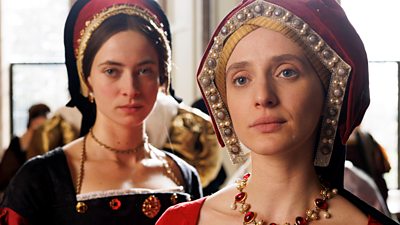
Please tell us about Mary – Princess to some, and Lady to others?
It’s an extraordinary journey. At the beginning of the series she is in what she would see as a cruel and awful exile away from Court, where she has been since the deposition of her mother – Katherine of Aragon – who she wasn’t able to see when she died. They were incredibly close and had a really extraordinary relationship. Katherine saw to it that Mary was incredibly well educated, pretty much to the level that a Prince would be. She was very much bred to be this golden child and an omen of sons to come. So she had this mythic quality of being the only one of her siblings to survive and she was doted on by her father and mother. Henry boasted that Mary never cried. This is a huge contrast to what happens following the marriage being dissolved, Mary being declared illegitimate, sent away and stripped of her title. So at the beginning of the series, she’s in this real space of violent turmoil where she’s railing against this idea that she must accept her father as head of the church, which for Mary, a staunch Catholic, is unthinkable. It’s glorious how resilient she is.
What is Mary’s relationship with Cromwell like?
This is the divine thing about Hilary’s work – there’s just endless layers and nuances and possibilities. That’s why it’s such a challenge and a treat to play, to try to honour the complexity of these layers, all of these different matters of politics and of the heart that are often so extremely at odds. There’s nothing more exhilarating than the relationship between Cromwell and Mary. Here are two people with polar opposite politics but who seem to be very drawn to each other and find a real kindred spirit in one another, for better or worse. I think neither of them are very accustomed to meeting somebody who really looks them in the eye and understands what they are seeing and is a real witness to them. I think Cromwell is very adept at remaining quiet and seeing deep into the hearts of people and playing these incredible long games, gambling and winning. And Mary is also a gambler, we see. And I think they’ve met their match with one another in a lot of ways, which is thrilling. She sort of sees him as her one ally, her one friend in the world. And at the same time, this is the man who oversaw the downfall of her mother.
What were your favourite filming locations?
There was one in particular which really struck me, the location we used for Hunsdon House, which had broken windows where jackdaws had flown through the chimneys. It was dressed to be very rundown… You could feel the melancholy in the place. These fantastic torn tapestries that really fed this feeling of what, to Mary, felt like imprisonment and being forgotten in these shadowy halls.
And how was working with Mark and Damian again?
It’s just the hugest honour and joy. They are so alive and it’s just the greatest joy to jump into this glorious wrestling match of wills. They both have an extraordinary sensitivity that is palpable. It feels like a closing of a circle to me – I did the first series as my first ever job when I was seventeen and I’ll never forget Mark’s incredible kindness, patience and generosity. He took the time to stop and ask me “do you know what’s happening?”, with all of these technical elements that were very new to me. And I was able to be like “… no!”, and he explained everything to me with such warmth. So to return ten years later was very meaningful.
Interview with Thomas Brodie-Sangster (Rafe Sadler)
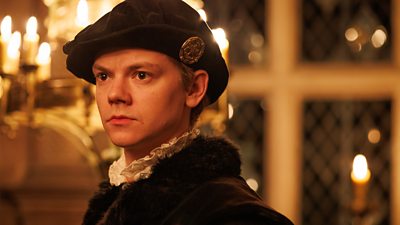
Please tell us about Rafe.
Rafe is one of the few good guys in this nasty, backstabbing world. The world of politics. He was taken in by Cromwell and trained up as his ward and prepped to eventually take over the place of Cromwell. He sees Cromwell as a father figure. He is, by all accounts, a good fellow. He loved his wife, had many children, and died in his eighties. I think he did well.
What qualities do you see in Rafe that enable him to navigate through these murky, treacherous waters and hold these positions?
He’s quiet but very observant. He’s a man of the shadows, as Cromwell is really. Cromwell learns quickly that the best way to have something implemented is to plant the seed in Henry’s mind and let him think that he came up with it. Rafe has picked up on that covert way of operating alongside such a big personality and with such noise going on.
What does Rafe love and respect in Cromwell?
Rafe respects the fact that Cromwell sticks to his guns. He’s not afraid to say what he thinks, he’s just careful about who he says it to, when he says it, and how he says it. I think that’s what has enabled him to get away with the things he has done and still have his head. He’s measured, thoughtful, knows how to act and deal with stress, and he’s able to easily plot and see the best course of action. I think that is a survival technique that’s very useful in the court.
What is Rafe’s relationship with Henry like?
Henry is a fearsome character, so I think Rafe is quite nervous. When we join The Mirror and the Light he’s only just got his station at court – he wants to do good, but he doesn’t want to stick out at all. He’s just got to get on with it, do the King’s bidding, and look after him, and do whatever is needed. I think he’s a good ear and he listens and gathers information and reports it back to Cromwell, almost like a spy. He’s biding his time so that he can get to know Henry and understand how his mind works so he can do what Cromwell does so wonderfully, which is essentially manipulate Henry to do what Cromwell really intends him to do. I think Rafe is aware that that is a very dangerous game to play. So if you’re going to choose to play that game, you need to do it very well.
What was it like to play Rafe again after almost a decade away from the character?
It’s been very fun coming back to Rafe. It’s odd because it’s been nine years and obviously I’ve changed as an individual, as a person, as has everyone else, but we’re picking up the same day the last series ended. It’s a direct continuity. But thankfully my character has gone up in the world so there’s a significant change – I have a nice new costume! It feels like coming back to an old friend, but there’s a bit more going on with Rafe this time round. He’s a little less naïve and he’s learnt a lot of lessons.
What was your favourite scene with Mark Rylance?
Every scene with Mark is a joy and a discovery. He does a huge amount of prep, but then he’ll come onto set and just let things be fresh and evolve in a very natural manner that just makes the whole experience very enjoyable and organic. Some of our last scenes together are heart-wrenching. He’s Rafe’s father figure, but we don’t tend to emote that much, and in those final scenes there’s a sense of vulnerability that I enjoyed playing with. I think that’s nice and refreshing to see these strong characters, not necessarily breaking, but just cracking slightly...
And how was working with Damian Lewis again?
Damian is great fun. He brings such energy to a set, he gets everyone laughing. He’s got a great presence, especially when he’s in costume and he’s up there on a pedestal looking very ‘Henry’!
Interview with Harriet Walter (Lady Margaret Pole)
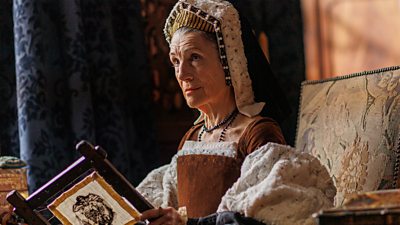
Please tell us about Lady Margaret and where we meet her in the series.
She’s on a slightly dangerous ridge because her family is very close to the throne and has more of a right to the throne, in her eyes, than the Tudors, because she’s the niece of Edward IV and Richard III. She’s a Plantagenet, which is the old school family who were involved in the War of the Roses. So she’s got the duality of having a sense of the nobility and immutable authority, but tied to that is the danger they constitute as a possible threat to the throne.
Could you talk about her relationship with Cromwell?
They are the clash of the two worlds – the old world order and the new world order. To her, the nobility have a right to be there and by their inheritance they are the people who should be running the country. So it’s unthinkable to her that someone who comes from the floors of a pub in Putney should be in charge of her future and destiny. There’s that clash of backgrounds and worlds, but there’s also a sort of respect and tension between them because they see in one another a fairly canny individual, and a certain kind of wit and warmth happens between them. Anybody at the top in any way in that world is very aware that what goes up must go down, and that people’s fortunes are on a wheel.
Can you tell us about the locations in the series?
What we’re so lucky with in this country is that there are so many places you can go to that just breathe the time you’re playing, so you don’t have to construct much, it’s all there for your imagination. There’s something very inspirational about knowing that this is where certain people stood that you might be playing, or a King visited this building. That’s all very helpful as an actor because you just need everything that your imagination can feed on.
Are you a fan of Hilary Mantel’s writing?
Absolutely. I met Hilary and we discussed where our two disciplines overlapped. It was quite a fascinating conversation, because she had the imagination of an actor. She felt inside people’s bodies, smelled what they smell, and touched what they’re touching. Her imagination seemed to be exceptionally vivid for the here and now of the past. It’s incredibly helpful for an actor to have that kind of writing to refer to. I’m touched to be carrying her work on in any way.
What do you hope viewers will take from the series?
What’s great is when you can bring history alive and identify with characters who are from a different time and realise we are not so different. And that we shouldn’t patronise the past – they didn’t have internet, they didn’t have modern medicine, they couldn’t fly to the moon – but they were no more stupid or clever, and they’re making the same mistakes we make. I just feel there are lessons to be learnt from history. Cromwell is a tough character but he’s been made incredibly human by Hilary Mantel, Mark, and the process of this whole creation.
Interview with Timothy Spall (The Duke of Norfolk)
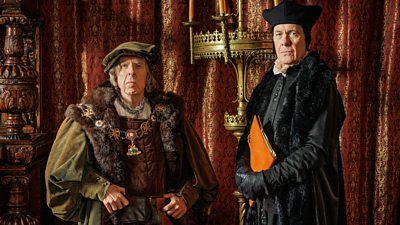
Where do we meet The Duke of Norfolk in The Mirror and the Light?
The Duke of Norfolk, having been instrumental in getting Anne Boleyn to become Queen, has also just been presiding over a trial which led to her execution. So when we see him, he’s managed to maintain, tenuously, his position in the Tudor Court. Like everyone, he’s in and out of favour and trying to maintain his status and influence on the King. He’s very much a mover and a shaker in that world. Someone determined to maintain his position and his influence.
Who were his allies at Court?
I don’t think any of them can tell because they move around a lot! They go in and out of favour because they’ve always got an eye on which way the King is looking, what suits them, what influence they can have, all basically under Henry’s dictatorship which is growing in volatility. Even the allies for one minute are their enemies the next!
What’s Norfolk’s relationship with Cromwell at this point, and how does it change?
The Duke of Norfolk is an elitist aristocrat who thinks that people who are of noble blood should be ruling and treated differently to ordinary folk. So he has the utmost respect for Cromwell’s abilities but despises the fact that he is ‘of low birth’. He doesn’t underrate his intelligence, cleverness, and power at all, but it galls him appallingly that he’s the son of a blacksmith and has so much influence and power with the King. Norfolk is a brute, he doesn’t hold his tongue, when he’s annoyed with you he lets you know and he’s an old friend of the King so he has a lot of influence with him. As far as Cromwell’s concerned, he’s keeping a very strong eye on him because he’s seen how influential he is with the King and he’s seen this reliance from Henry on him which he’s not comfortable with.
Could you talk us through the costumes?
We have a brilliant costume team. I’ve got a very cheeky pair of leather tights on here. I’ve got these thigh-length boots, I’ve got a jerkin, a codpiece. All the men have a codpiece which was an acceptable fashion and evidently a mark of your status and virility. Me thinks the Duke of Norfolk protesteth – or displayeth – too much! But there we are. It’s superb. The colours are very important which show your rank, wealth and status. Where you live, what you have, what you display.
How was it to join the series, and work with the cast and crew?
I thought the first series was superb. So beautifully directed, so naturally acted. The action and direction are wonderful. To work with Peter, a director who is so across the material that he’s been living this for ten years, is brilliant. Damian, I’ve never worked with before but I’ve been watching him, admiring him for a long time. Mark and I were at RADA together. As I was leaving, Mark was coming in. I’ve known Mark coming on 50 years so it’s great to be working with him again. His performance is so brilliant, as are all of them. It was a daunting task to take over this role from someone as brilliant as the late great Bernard Hill, who played him in the first series. I hope I have done him proud.
What would you like viewers to get from watching this series?
I think – and this is about the brilliance of the writing but also the brilliance of the performers – Mark is playing a character who is ruthless and Damian is playing a character who is ruthless, but they happen to be amiable and so you root for them. Particularly Cromwell, this is about a man who has to do the most appalling things, but you love him even though you know he’s doing terrible things.
Interview with Harry Melling (Thomas Wriothesley)
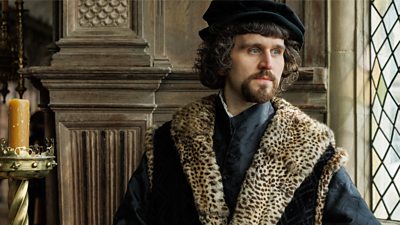
Please tell us about Thomas.
He’s a fascinating character because you meet him and he’s on the ascension. He’s trying to climb the ranks within this political world. No one quite knows how to say his name, so he accumulates the nickname of ‘Call Me Risley’ over the series. He’s incredibly clever, smart, and has an amazing political mind that can analyse situations quickly and astutely. There are a few things that frustrate him – he’s quite thin skinned. He thinks he’s the butt of the joke quite a lot. So throughout the series, he’s constantly manoeuvring with Cromwell and trying to show him what a smart kid he is.
It must be frustrating for him as there are quite a few smart kids in Cromwell’s household… Can you tell us about that set-up and Wriostheley’s relationship with Cromwell?
Cromwell’s household consists of Thomas, Richard Cromwell, Rafe Sadler and Gregory Cromwell. We’re all young guns trying to prove ourselves to this mastermind Thomas Cromwell. So naturally, like any sibling relationship, there’s friction. Wriothesley’s relationship with Cromwell is really quite nuanced and knotty – he starts off trying to show Cromwell what an addition he is to the team. He really needs a father figure in Cromwell and he just doesn’t receive it back, so that builds into a great frustration, sadness, and loneliness. As the story progresses, we feel Wriothesley start to pull away from Cromwell and find different avenues in terms of how to best secure his safety in a very problematic world.
What is Wriothesley’s relationship with King Henry like?
To begin with he’s terrified of him. I think he’s always trying to impress him, there’s a real ambition there in terms of winning Henry over. As the series progresses, I think he gets more comfortable in the presence of Henry, but that fear, the fact that Henry can change his mind just like that, never really changes for him.
Could you talk to us about your costume?
The costume is just remarkable, the detail that’s gone into it – it makes you sit and stand in a certain way that gives you an insight into the character. Certainly, there’s flourishes of a bit of a peacock here. He’s someone who’s come from wealth, who is part of the aristocracy. As you can see, he likes to flaunt that and show off a bit! There were certain traditions in terms of clothing – I know that the colour black was the most expensive dyed cloth to have, so people wearing black was a real statement of wealth, power and position.
Do you have a favourite scene?
One of my favourite scenes is a funny one where Henry has decided he’s going to see Anne of Cleves early, he’s going to surprise her, and he’s going to go in disguise. Cromwell and Wriothesley are like “are you sure this is a good idea…’ and he’s like “yes, yes it is! I’m going to wear a costume and I’m going to surprise her”. And of course, eventually, he does do it, because he’s King Henry.
How does it feel to bring Hilary Mantel’s vision to life?
Having Hilary’s book as a bible to work alongside the script has just been invaluable. Her detail and language are just extraordinary. A lot of the dialogue is Hilary’s – it just lends itself to the richness of the world and the language. And the complicated manoeuvres they have to make throughout the series, nothing is ever set, everything is in constant movement. I think that is wonderfully depicted in all of Hilary’s books.
What do you hope viewers will take away from the series?
I hope viewers get just as much of a thrill as I did watching the first series! This series really explodes. You’re playing with everything that’s been built up already, really exploring all of these different avenues in a deeper way. Certainly, the rise and fall of people is on display in this series. That’s a tremendously exciting thing to watch. In a weird way, coming to be in this cast I feel like I already knew the characters having watched the first series. It’s just as thrilling and exciting, complicated and rich.
Interview with Alex Jennings (Stephen Gardiner)
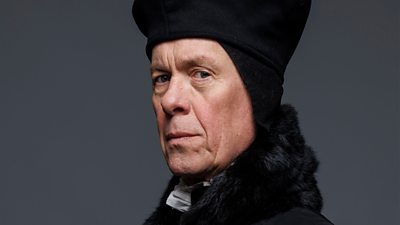
Please tell us about Stephen Gardiner
He’s a Catholic theologian – an incredibly well-educated prelate who was mentored by Erasmus, one of the great theologians and humanists of the time, and then by Cardinal Wolsey. He’s worked his way up the ecclesiastical and political ladder, and at the time of this story he’s returned from a kin of exile as a diplomat in France. He’s a real survivor, manoeuverer and manipulator.
What are Stephen’s views on Henry and Cromwell’s reforms of the church?
He’s the old religion and he’s very against reform. He manages to, with Cromwell’s decline, set the clock back as far as reform is concerned. He’s a man of huge religious conviction which puts him in great opposition to Cromwell. They’re really antagonistic towards each other, and he becomes one of the team who help to bring Cromwell down.
How did you find the costumes?
There’s a very sleek and slightly oily feel to the way Stephen Gardiner looks as he slithers his way around the court. I get to wear a very unflattering Bishop’s snood, a hat, which I hate! I’m happier in the 1930s and 1940s really, but it’s good for me to dip into something that doesn’t necessarily flatter the way I look – that helps enormously playing this guy.
And how did you find working with the cast?
To work with Mark for the first time was really exciting, him sitting on the other side of the table. Damian and I were at the Royal Shakespeare Company together. He’s a mate so to work with him again has been fantastic. I first worked with him… I can’t remember how long ago! 25 years ago, when Damian was just starting out. We were in Much Ado About Nothing together at the RSC and I thought ‘oh hello, he’s good!’. Tim Spall is an old friend of mine so it’s great to be working with people that you really respect and have history with, and then new really great guys like Harry Melling and Tom Mothersdale. It was a really exciting group of actors to be in a room with doing those great big scenes.
Interview with Director and Executive Producer Peter Kosminsky
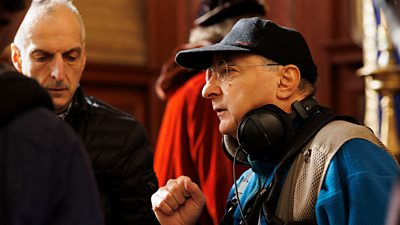
Where do we rejoin the story in The Mirror and the Light?
The Mirror and the Light is based on the last novel that Hilary Mantel wrote before she very sadly died. It picks up directly from the moment when the earlier books end: the day of Anne Boleyn’s execution. So, it was a challenge for us having around a decade between when we finished shooting the original Wolf Hall series and when we started filming The Mirror and the Light, yet the story was carrying on as if uninterrupted. Having said that, the two TV series cover a ten-year period in Thomas Cromwell’s life, so at some point during the series, Thomas Cromwell and the other characters really need to age.
Can you tell us about your approach to working with Mark and Damian on set?
I have a structure to my day during filming – I arrive very early, grab a quick bite of breakfast and then I go into makeup. It’s a good moment to talk to cast because they’re usually quite relaxed so it’s a good moment for me to talk to them about the scene ahead. Sometimes Damian and Mark had found lines in the novel – and this is a very faithful adaptation – that we had not included. Of course, I won’t always agree to include it, but my general instinct is that if an actor, in preparing for the scene, feels that additional lines would enhance what they’re trying to do and they can deliver it in a way that doesn’t feel written, I’d like to include it. On set I would strongly encourage them to try things.
What was it like returning to this project?
For most people involved, this will have felt like returning to something after a significant number of years, but not for me. Hilary Mantel was sending me the novel as she was writing it in 100-page instalments. We were having a dialogue before she submitted the novel to the publisher. So, I have been working on this pretty much since we delivered and transmitted the original Wolf Hall series back in 2015. I have never left the show.
What is it that appeals to you about this rich, treacherous, captivating story?
It is a complex, multi-faceted piece of writing. But if I were to ask myself what is it about Wolf Hall that inspires me the most, it’s something that Hilary said to me right at the very beginning of the journey – “remember that these characters don’t know that they’re characters in history. To them, they are living their lives just as you or I, in what is, for them, the present day”. Anne Boleyn doesn’t know that she’s one of six wives, she doesn’t know that she will be beheaded by a swordsman from Calais. She sees herself as a reformer, as somebody who is living in a fantastically exciting time in history when there’s significant religious and political change. I’ve focused on that and tried to get that sense of now into the way we have brought this extraordinary literary achievement to the screen by shooting it in a very contemporary, documentary style, with handheld cameras and a sense of discovering this world with Thomas Cromwell. And it all flows from that original comment that Hilary made to me. Cromwell is a highly contemporary figure. He’s not a cardinal or an aristocrat. He’s an ordinary man placed in an extraordinary situation, perhaps the first professional civil servant. He rises to the second most powerful man in the kingdom after Henry. But that turns out to be a terrifying dangerous position in the court of such capricious monarch. In a very real sense, The Mirror and the Light is a portrait of what it is like to be at the beck and call of a despot, a man whose ego is completely out of control.
Can you tell us about some of the amazing locations?
Many of the locations where Henry and his Court lived their lives no longer exist. The challenge for us was to create spaces in buildings that were authentic in look and feel, that could help us evoke the sense of what life must have been like. We did have one big advantage this time – the wonderful reception of the historians and curators at Hampton Court Palace who welcomed us for the first time. The highlight for me, without a doubt, was the fact that we were permitted to film in the Great Hall at Hampton Court. As far as I know, we are the first drama ever to be allowed to film in that room. Just to be able to walk our cast across that space which we knew Henry, Jane Seymour, and Thomas Cromwell had walked through in their time 500 years before was an extraordinary experience. The tapestries on the walls are said to be, after the Crown Jewels, the most valuable thing that England owns.
What would you like viewers to keep in mind from Wolf Hall when they start watching The Mirror and the Light?
The original series, Wolf Hall, is a story of Cromwell’s rise from the position of a blacksmith’s son, kicked almost to death by his father on the cobbles of the smithy where he was brought up, to being the second most powerful man in England. It’s a story of bravery, of gall, of almost the first time in British history a man rises to a position of enormous power purely because of his gifts, intellect and prowess, rather than who he’s descended from, his wealth, or his position in the church. The first series had a sense of climbing and rising, but when you reach the summit, the only way is down with people below snapping at your heels. This second series is a story of Cromwell struggling to maintain his position, and eventually losing that battle. It’s a more internal story about the debate and battle that’s going on in Cromwell’s mind.
Can you tell us about Cromwell’s relationship with women in the series?
In general, Cromwell’s behaviour towards the women is markedly different from the way he behaves towards men. Cromwell sees them as people, and he listens to women in his life. He’s interested in the women that he meets so he listens, sees them, and takes account of them. And I think that women in that era, from what one can tell from history books and contemporaneous accounts, feltvery unseen. We can tell from letters that women approached Cromwell and wrote to him, talked to him and appealed to him, because they knew that they would be listened to and not just dismissed. Apart from Cromwell’s relationship with Henry VIII, it’s his relationships with the women in his life that are the most telling and give rise to the most powerful and emotionally complicated scenes in the drama.
Interview with Peter Straughan (Screenwriter)
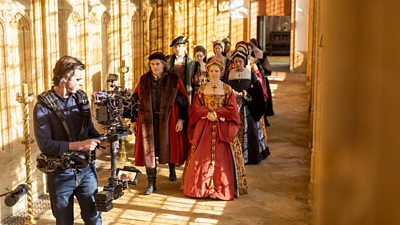
Could you tell us about the process of adapting The Mirror and the Light? Was it a different process to adapting the first Wolf Hall series?
In some ways it felt like creating the shadow, or photographic negative, of Wolf Hall. With the first series, I wanted the narrative energy to focus down and down into a narrower and more dangerous stream – one that ends at a sword point: the execution of Anne. Everything in Cromwell’s life – his battle for survival, for success, for revenge – bears down on that one moment. With The Mirror and The Light, it was as if the process was reversed. We start from that point of victory over Anne. Cromwell has apparently defeated all his opponents. The period of ‘wreckage’ is over, so now Cromwell can begin his reign of building. He has a vision of a new England, a new religion, a new role in Europe with new alliances. The narrative spreads out again. He is everywhere, handling everything – dealing with the rising in the North, the dissolution of the monasteries, finding Henry a wife, forging alliances with the Protestant Princes… But, as Hilary says: "You can write on England, but what was written before keeps showing through.” The counter-movement has already begun. Cromwell’s enemies slowly regroup and grow in power and the narrative gathers what it needs to bring the story back to the execution block again.
How does it feel returning to the world of Thomas Cromwell after almost a decade since the first series?
I think Hilary is one of the greatest novelists this country has ever produced and Cromwell is her greatest creation. It was a huge privilege and pleasure to be able to immerse myself in the brilliant world of her imagination again.
Please tell us about where we find Cromwell in The Mirror in the Light. How has his relationship with Henry VIII and those around him changed?
We find Cromwell in a treacherous position. On the one hand, he has triumphed over his opponents. Henry continues to give him more responsibility, more titles. His power seems to make him unassailable. He is second only to the king now. But, as he learnt from his old master Wolsey, that can be a very dangerous place to be. As Chapuys points out to Cromwell, he has no great family behind him. He is entirely reliant on ‘the next beat of Henry’s heart.’ If Henry should turn against him, he has no allies to protect him. And Henry is terrifyingly mercurial. Peter Kosminsky and I were very interested in threading two other ideas through the drama. Firstly, we wanted to draw out the notion that there is an element of humanity in Cromwell which leaves him ultimately vulnerable. When his protege Wriothesley urges him to destroy his arch-enemy Norfolk when he has the chance, he refuses. It’s a decision which will be his undoing. And secondly, we felt that Cromwell is increasingly haunted by the past, by the ghosts of his past deeds. We felt that he comes to doubt his own loyalty to his old master Wolsey. We became fascinated by the idea that Cromwell’s downfall is, at least in part, his own doing.
What do you hope viewers will take away from the series?
Well, in this year of elections, I think you can enjoy The Mirror and the Light as a thrilling political drama that explores power – its temptations and its corrupting influence. But for me, the greatest pleasure is Mark’s performance as Cromwell and Damian’s as King Henry VIII – in all their witty, savage, devastating humanity.
Interview with Colin Callender (Executive Producer)
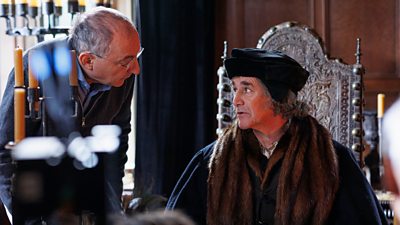
How does it feel to return to Wolf Hall after almost a decade since the first series?
Returning to Wolf Hall after ten years was like revisiting old friends. We’d lived with these characters who are so vibrant and jumped off the screen in the first season, so coming back to them ten years later was as though we were coming home. It was wonderful.
Could you tell us about the wonderful cast – from the returning actors to the brilliant newcomers.
The real challenge of getting the production up and running was bringing back all the cast members from the first time round and juggling everyone’s availability! And of course in a lot of cases, particularly for Mark and Damian, their careers have really soared in the time between the two series. Mark has become an Oscar-winning actor and has been knighted. Damian has starred in a couple of very popular series in the US. So juggling availability was a challenge. And sadly, in a couple of cases, some actors couldn’t return – either because of other commitments or for personal reasons. One of the things I loved about the first time round, and I think this is particularly true of this season, is the mix of British acting royalty and newcomers. There are a lot of actors and faces that the audience haven’t seen before in this series which is wonderful. The actor that plays Princess (or Lady) Mary, Lilit, is extraordinary and I think that they are going to break out through this. It’s just great to see all these wonderful British actors working together.
Why do you think this is an important drama for the ���˿���?
This is a production that no one else would make other than the ���˿���. No other British broadcaster would make it, none of the streamers would make it. Wolf Hall is the sort of drama that reminds us why we need the ���˿��� because it’s a uniquely British project, it’s about our history, it’s about our DNA, from one of Britain’s most celebrated novelists. So we need to thank the ���˿��� for being there and particularly thankful because it is funded by the licence fee it allows the ���˿��� to make editorial decisions based on serving British audiences, not driven by the demands of advertisers, the quest for big ratings or a need to serve the global marketplace. And that in turn allows the ���˿��� to take big creative leaps that others cannot take and their success as a broadcaster is not contingent on the success or failure of any one show. The ���˿��� is a unique cultural institution at the heart of British life and without it shows like Wolf Hall would never get made.
What should viewers bear in mind coming from the series when watching The Mirror and the Light?
At its simplest level, this is the story of a guy with a really irascible, difficult boss. But in his case, if he screws up, he’s not going to get fired, he’s going to get his head chopped off. In one sense it’s a story that almost everyone can relate to, but in a more profound sense, this is a story about the exercise of power. It’s about a man who’s trying to walk the high wire act of doing the right thing and surviving. There have been six prime-ministers and five elections in Britain since the first series aired. Part of what has been at stake in all those elections is what do we want of our leaders, how do we want them to behave, and are they acting for themselves or for us, the public. That’s right at the heart of this story too. It has enormous contemporary resonances. It has an immediacy that I think is very powerful.
How was it working with Peter again and the brilliant creative team? Has it been wonderful bringing a lot of people back together?
One of the great things about working with Peter is that he has a creative team who have worked with him over and over again for years – Gavin Finney the cinematographer, Debbie Wiseman the composer (who also composed music for King Charles’s coronation!), Pat Campbell the production designer, Joanna Eatwell the costume designer – so they have a shorthand which is remarkable. Peter is an extraordinary director. He’s enormously well-prepared, he has a profound understanding of what the story is and a very clear vision of how to tell it. As a producer, it’s wonderful to work with a director who has such a clear vision, and the talent and capacity to execute it.
You filmed in some incredible locations. How was that experience?
The whole series was shot on location and because we were shooting through a couple of seasons, there were times when the weather was freezing. So while the crew were chilled to the bone, the actors were all wrapped up in big fur coats or the sort of warm clothes that people would have worn at the time. There was no central heating, no carpets, it was all brickwork. So not only do you get the glorious visuals of the real Tudor world because we shot everything on location, but the feel of the locations, the light, the weather, the sound of footsteps on the stone floors, help create this very authentic mood that permeates the whole series.
Why should viewers be excited for The Mirror and the Light?
Intimate, thrilling and deeply moving, The Mirror and the Light shines a fresh light on the politics of power and the personal price paid by those who wield it. It has a Booker-winning novelist, Oscar-nominated screenwriter, a seven time BAFTA-winning director, it has a Tony, Olivier and Oscar winning actors, and it has Golden Globe, Emmy, RTS and BAFTA-winning producers. It’s a Rolls Royce!